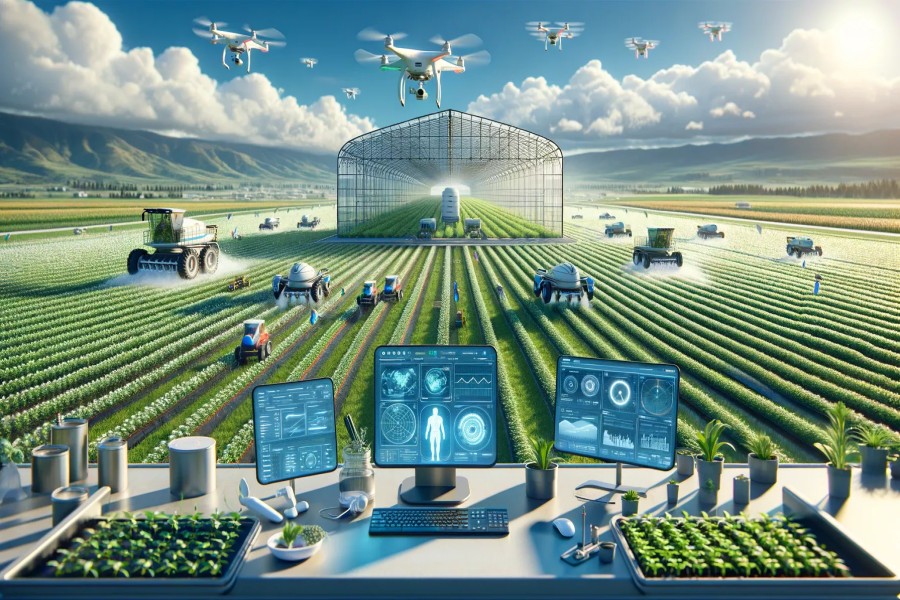Generative AI in Agriculture: Revolutionizing Crop Management
Generative Artificial Intelligence (AI) has emerged as a transformative technology in various industries, and its impact on agriculture is particularly noteworthy. By leveraging advanced algorithms, machine learning, and big data, generative AI is revolutionizing the way farmers manage crops. This one-page write-up explores the applications of generative AI in agriculture and highlights its potential benefits for farmers and the agricultural industry as a whole.
Crop Yield Prediction
Generative AI algorithms can analyze vast amounts of historical data, including climate patterns, soil conditions, and crop characteristics, to accurately predict crop yields. By considering various factors, such as temperature, rainfall, nitrogen levels, and disease prevalence, generative AI models can provide farmers with valuable insights into expected crop yields. This enables farmers to optimize resource allocation, plan harvesting schedules, and make informed decisions regarding crop management strategies.
Disease and Pest Management
Identifying and combating crop diseases and pests is crucial for ensuring healthy and abundant harvests. Generative AI models can analyze diverse datasets, including images, sensor data, and historical records, to detect early signs of diseases or infestations. By employing computer vision techniques, these models can identify subtle changes in plant health, enabling timely intervention. This helps farmers minimize crop losses, reduce pesticide usage, and enhance overall sustainability.
Precision Agriculture
Generative AI is playing a vital role in the implementation of precision agriculture techniques. By integrating data from satellite imagery, drones, and ground sensors, generative AI models can generate detailed maps of crop health, soil moisture levels, and nutrient distribution. This information enables farmers to implement site-specific interventions, such as precisely targeted irrigation, fertilization, and pesticide application. As a result, resources are utilized efficiently, minimizing waste and enhancing productivity.
Crop Breeding and Optimization
Generative AI algorithms are being employed to expedite the crop breeding process. By analyzing genetic and phenotypic data, these models can identify desirable traits and predict the outcome of crossbreeding experiments. This accelerates the development of high-yielding, disease-resistant, and climate-resilient crop varieties. Furthermore, generative AI can optimize crop growth parameters, such as lighting, temperature, and humidity, in controlled environment agriculture systems, leading to improved crop quality and yield.
Sustainable Resource Management
Generative AI models facilitate sustainable resource management practices in agriculture. By analyzing historical and real-time data, these models can optimize irrigation schedules, minimize water consumption, and reduce the environmental impact of farming operations. Additionally, generative AI can optimize the allocation of fertilizers and pesticides, reducing chemical usage and preventing soil and water contamination.
Optimized Resource Allocation
The sustainable use of resources in agriculture is critical. Generative AI uses large-scale data analysis to maximize the use of resources. With the use of historical production data and land topography, AI algorithms build intelligent models that help farmers use resources as efficiently as possible. This leads to less water use, lower energy use, and increased land productivity. Agriculture becomes a shining example of sustainability and fiscal responsibility by using Generative AI’s intelligent resource management.
Enhanced Decision-Making and Predictive Analytics
Farmers now have strong tools for predictive analytics and decision-making thanks to generative AI. Generic artificial intelligence (AI) is able to forecast future crop yields, market demand, and even possible disease outbreaks by utilizing machine learning algorithms and historical data. This enables farmers to choose crops, plan planting dates, and develop market strategies based on data.
Furthermore, generative AI can help handle the intricate interactions between different elements influencing crop growth. Generative AI algorithms take into account a wide range of factors, including plant diseases, soil moisture content, and weather, to determine the optimal agricultural practices for given situations. By using this knowledge, farmers can better manage their operations and adjust to shifting circumstances, which eventually boosts sustainability and profitability. There are several and significant advantages to generative AI in agriculture.
Reduced Environmental Impact
Reducing the environmental impact of the agriculture business is one of the biggest advantages of generative AI. Generative AI contributes to sustainable farming methods by minimizing the usage of agrochemicals and optimizing resource allocation.
For the purpose of determining the ideal quantity of water, fertilizer, and pesticides needed for a given crop, generative AI systems can evaluate data pertaining to soil composition, weather patterns, and crop growth. By using a precise method, soil degradation is avoided, chemical discharge is decreased, and resource use is minimized. Furthermore, generative AI can help find eco-friendly substitutes like organic fertilizers and natural pest management techniques.
Source:

